2014江苏高考英语试卷及答案
2014年江苏省高考英语试题解析版

2014年江苏省高考英语试题(附解析)第一部分听力(共两节,满分30分)做题时,先将答案标在试卷上。
录音内容结束后,你将有两分钟的时间将试卷上的答案转涂到答题卡上。
第一节(共5小题;每小题1.5分,满分7.5分)听下面5段对话.每段对话后有一个小题,从题中所给的A、B、C三个选项中选出最佳选项,并标在试卷的相应位置。
听完每段对话后,你都有10称钟的时间来回答有关小题如阅读下一小题。
每段对话仅读一遍。
例:How much is the shirt?A。
£19。
15。
B. £9.18。
C。
£9.15。
答案是C。
1. What does the woman want to do?A. Find a place. B。
Buy a map。
C。
Get an address。
2. What will the man do for the woman?A。
Repair her car.B。
Give her a ride。
.C. Pick up her aunt.3。
Who might Mr。
Peterson be?A。
A new professor。
B. A department head。
C. A company director。
4. What does the man think of the book?A. Quite difficult。
.B。
Very interesting.C. Too simple.5。
What are the speakers talking about?A. Weather.B. Clothes.C。
News.第二节(共15小题;每小题1.5分,满分22.5分)听下面5段对话或独白.每段对话或独白后有几个小题,从题中所给的A、B、C三个选项中选出最佳选项,并标在试卷的相应位置.听每段对话或独白前,你将有时间阅读各个小题,每小题5秒钟;听完后,各小题将给出5秒钟的作答时间。
(完整word版)2014江苏高考英语卷及答案
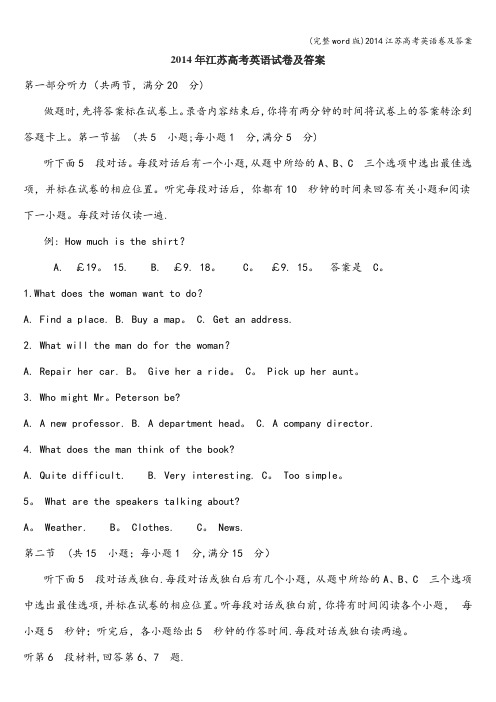
2014年江苏高考英语试卷及答案第一部分听力(共两节,满分20 分)做题时,先将答案标在试卷上。
录音内容结束后,你将有两分钟的时间将试卷上的答案转涂到答题卡上。
第一节摇(共5 小题;每小题1 分,满分5 分)听下面5 段对话。
每段对话后有一个小题,从题中所给的A、B、C 三个选项中选出最佳选项,并标在试卷的相应位置。
听完每段对话后,你都有10 秒钟的时间来回答有关小题和阅读下一小题。
每段对话仅读一遍.例: How much is the shirt?A. £19。
15.B. £9. 18。
C。
£9. 15。
答案是C。
1.What does the woman want to do?A. Find a place.B. Buy a map。
C. Get an address.2. What will the man do for the woman?A. Repair her car. B。
Give her a ride。
C。
Pick up her aunt。
3. Who might Mr。
Peterson be?A. A new professor.B. A department head。
C. A company director.4. What does the man think of the book?A. Quite difficult.B. Very interesting. C。
Too simple。
5。
What are the speakers talking about?A。
Weather. B。
Clothes. C。
News.第二节(共15 小题;每小题1 分,满分15 分)听下面5 段对话或独白.每段对话或独白后有几个小题,从题中所给的A、B、C 三个选项中选出最佳选项,并标在试卷的相应位置。
听每段对话或独白前,你将有时间阅读各个小题,每小题5 秒钟;听完后,各小题给出5 秒钟的作答时间.每段对话或独白读两遍。
2014年江苏省高考英语试题解析版

2014年江苏省高考英语试题(附解析)第一部分听力(共两节,满分30分)做题时,先将答案标在试卷上。
录音内容结束后,你将有两分钟的时间将试卷上的答案转涂到答题卡上。
第一节(共5小题;每小题1.5分,满分7.5分)听下面5段对话。
每段对话后有一个小题,从题中所给的A、B、C三个选项中选出最佳选项,并标在试卷的相应位置。
听完每段对话后,你都有10称钟的时间来回答有关小题如阅读下一小题。
每段对话仅读一遍。
例:How much is the shirt?A. £19.15.B. £9.18.C. £9.15.答案是C。
1. What does the woman want to do?A. Find a place.B. Buy a map.C. Get an address.2. What will the man do for the woman?A. Repair her car.B. Give her a ride..C. Pick up her aunt.3. Who might Mr. Peterson be?A. A new professor.B. A department head.C. A company director.4. What does the man think of the book?A. Quite difficult..B. Very interesting.C. Too simple.5. What are the speakers talking about?A. Weather.B. Clothes.C. News.第二节(共15小题;每小题1.5分,满分22.5分)听下面5段对话或独白。
每段对话或独白后有几个小题,从题中所给的A、B、C三个选项中选出最佳选项,并标在试卷的相应位置。
听每段对话或独白前,你将有时间阅读各个小题,每小题5秒钟;听完后,各小题将给出5秒钟的作答时间。
2014年江苏英语高考试卷含答案和解析
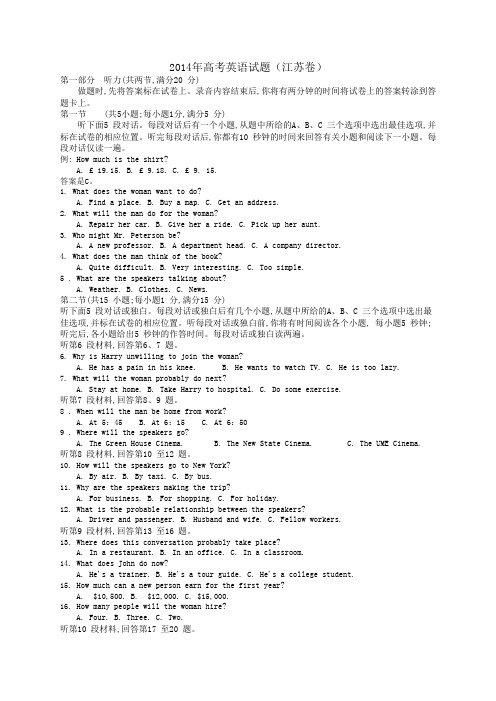
2014年高考英语试题(江苏卷)第一部分听力(共两节,满分20 分)做题时,先将答案标在试卷上。
录音内容结束后,你将有两分钟的时间将试卷上的答案转涂到答题卡上。
第一节 (共5小题;每小题1分,满分5 分)听下面5 段对话。
每段对话后有一个小题,从题中所给的A、B、C 三个选项中选出最佳选项,并标在试卷的相应位置。
听完每段对话后,你都有10 秒钟的时间来回答有关小题和阅读下一小题。
每段对话仅读一遍。
例: How much is the shirt?A. £ 19.15.B. £ 9.18.C. £ 9. 15.答案是C。
1. What does the woman want to do?A. Find a place.B. Buy a map.C. Get an address.2. What will the man do for the woman?A. Repair her car.B. Give her a ride.C. Pick up her aunt.3. Who might Mr. Peterson be?A. A new professor.B. A department head.C. A company director.4. What does the man think of the book?A. Quite difficult.B. Very interesting.C. Too simple.5 . What are the speakers talking about?A. Weather.B. Clothes.C. News.第二节(共15 小题;每小题1 分,满分15 分)听下面5 段对话或独白。
每段对话或独白后有几个小题,从题中所给的A、B、C 三个选项中选出最佳选项,并标在试卷的相应位置。
听每段对话或独白前,你将有时间阅读各个小题, 每小题5 秒钟;听完后,各小题给出5 秒钟的作答时间。
2014年江苏高考英语试卷含答案
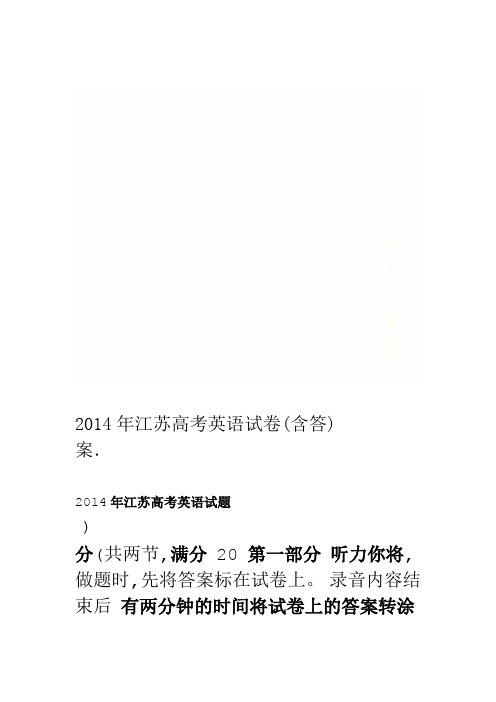
2014年江苏高考英语试卷(含答)案.2014年江苏高考英语试题)分(共两节,满分 20 第一部分听力你将,做题时,先将答案标在试卷上。
录音内容结束后有两分钟的时间将试卷上的答案转涂到答题卡上。
) ,满分 5 分分第一节 (共 5 小题;每小题 1 从题中所5 段对话。
每段对话后有一个小题,听下面并标在试卷、C 三个选项中选出最佳选项, 给的A、B秒钟的时,你都有 10 的相应位置。
听完每段对话后每段对话仅读一间来回答有关小题和阅读下一小题。
遍。
: How much is the shirt? 例 9. 15. C. £A. £ 19.15. B. £ 9. 18. C。
答案是 1. What does the woman want to do?C. Get an A. Find a place. B. Buy a map. address.2. What will the man do for the woman?C. Pick A. Repair her car. B. Give her a ride. up her aunt.3. Who might Mr. Peterson be?C. A. A new professor. B. A department head. A company director.4. What does the man think of the book?C. B. Very interesting. A. Quite difficult. Too simple.5. What are the speakers talking about?C. News. B. Clothes. A. Weather. )分每小题 1 分,满分15 小题(第二节共15 ;每段对话或独白后有几个听下面 5段对话或独白。
三个选项中选出最佳选、C B、从题中所给的小题, A你,听每段对话或独白前项,并标在试卷的相应位置。
2014年高考英语(江苏卷)含答案

英语试题第一部分听力(共两节,满分20 分)做题时,先将答案标在试卷上。
录音内容结束后,你将有两分钟的时间将试卷上的答案转涂到答题卡上。
第一节(共5 小题;每小题1 分,满分5 分)听下面 5 段对话。
每段对话后有一个小题,从题中所给的A、B、C 三个选项中选出最佳选项,并标在试卷的相应位置。
听完每段对话后,你都有10 秒钟的时间来回答有关小题和阅读下一小题。
每段对话仅读一遍。
例: How much is the shirt?A. £ 19. 15.B. £ 9. 18.C. £ 9. 15.答案是C。
1. What does the woman want to do?A. Find a place.B. Buy a map.C. Get an address.2. What will the man do for the woman?A. Repair her car.B. Give her a ride.C. Pick up her aunt.3. Who might Mr. Peterson be?A. A new professor.B. A department head.C. A company director.4. What does the man think of the book?A. Quite difficult.B. Very interesting.C. Too simple.5. What are the speakers talking about?A. Weather.B. Clothes.C. News.第二节(共15 小题;每小题 1 分,满分15 分)听下面5 段对话或独白。
每段对话或独白后有几个小题,从题中所给的A、B、C 三个选项中选出最佳选项,并标在试卷的相应位置。
听每段对话或独白前,你将有时间阅读各个小题,每小题5 秒钟;听完后,各小题给出 5 秒钟的作答时间。
江苏2014年高考英语试题和答案

2014年江苏高考英语试题第一节: 单项填空 (共 15 小题; 每小题 1 分, 满分 15 分)21. Lessons can be learned to face the future, ________ history cannot be changed.A. thoughB. asC. sinceD. unless22. The book has helped me greatly in my daily communication, especially at work ________a goodimpression is a must.A. whichB. whenC. asD. where23. —How much do you know about the Youth Olympic Games to be held in Nanjing?—Well, the media ________ it in a variety of forms.A. coverB. will coverC. have coveredD. covered24. Tom always goes jogging in the morning and he usually does push-ups too to stay ________.A. in placeB. in orderC. in shapeD. in fashion25. Top graduates from universities are ________ by major companies.A. chasedB. registeredC. offeredD. compensated26. —What a mess! You are always so lazy!—I’m not to blame, mum. I am ________ you have made me.A. howB. whatC. thatD. who27. She was put under house arrest two years ago but remained a powerful ________ in last year’s election.A. symbolB. portraitC. identityD. statue28. The idea “happiness, ” ________, will not sit still for easy definition.A. to be rigidB. to be sureC. to be perfectD. to be fair29. The lecture ________, a lively question-and-answer session followed.A. being givenB. having givenC. to be givenD. having been given30. —Dad, I don’t think Oliver the right sort of person for the job.—I see. I’ll go right away and ________.A. pay him backB. pay him offC. put him awayD. put him off31. It was sad to me that they, so poor themselves, ________ bring me food.A. mightB. wouldC. shouldD. could32. I can’t meet you on Sunday. I’ll be ________ occupied.A. alsoB. justC. neverthelessD. otherwise33. Legend has it that the origin of the Dragon Boat Festival is to ________ the soul of QuYuan.A. rememberB. remindC. recoverD. recall34. Good families are much to all their members, but ________ to none.A. somethingB. anythingC. everythingD. nothing35. —________ ! Somebody has left the lab door open.—Don’t look at me.A. Dear meB. Hi, thereC. Thank goodnessD. Come on第二节: 完形填空 (共 20 小题; 每小题 1 分, 满分 20 分)Dale Carnegie rose from the unknown of a Missouri farm to international fame because he found a way to fill a universal human need.It was a need that he first 36 back in 1906 when young Dale was a junior at State Teachers College in Warrensburg. To get an 37 , he was struggling against many difficulties. His family was poor. His Dad couldn’t afford the 38 at college, so Dale had to ride horseback 12 miles to attend classes. Study had to be done 39 his farm-work routines. He withdrew from many school activities 40 he didn’t have the time or the 41 . He had only one good suit. He tried 42 the football team, but the coach turned him down for being too 43 . During this period Dale was slowly 44 an inferiority complex (自卑感), which his mother knew could 45 him from achieving his real potential. She 46 that Dale join the debating team, believing that 47 in speaking could give him the confidence and recognition that he needed.Dale took his mother’s advice, tried desperately and after several attempts 48 made it. This proved to be a 49 point in his life. Speaking before groups did help him gain the 50 he needed. By the time Dale was a senior, he had won every top honor in 51 . Now other students were coming to him for coaching and they, 52 , were winning contests.Out of this early struggle to 53 his feelings of inferiority, Dale came to understand that the ability to 54 an idea to an audience builds a person’s confidence. And, 55 it, Dale knew he could do anything he wanted to do—and so could others.36. A. admitted B. filled C. supplied D. recognized37. A. assignment B. education C. advantage D. instruction38. A. training B. board C. teaching D. equipment39. A. between B. during C. over D. through40. A. while B. when C. because D. though41. A. permits B. interest C. talent D. clothes42. A. on B. for C. in D. with43. A. light B. flexible C. optimistic D. outgoing44. A. gaining B. achieving C. developing D. obtaining45. A. prevent B. protect C. save D. free46. A. suggested B. demanded C. required D. insisted47. A. presence B. practice C. patience D. potential48. A. hopefully B. certainly C. finally D. naturally49. A. key B. breaking C. basic D. turning50. A. progress B. experience C. competence D. confidence51. A. horse-riding B. football C. speech D. farming52. A. in return B. in brief C. in turn D. in fact53. A. convey B. overcome C. understand D. build54. A. express B. stress C. contribute D. repeat55. A. besides B. beyond C. like D. with第三部分: 阅读理解 (共 15 小题; 每小题 2 分, 满分 30 分)请阅读下列短文, 从短文后各题所给的 A、B、C、D 四个选项中, 选出最佳选项, 并在答题卡上将该项涂黑。
2014年江苏省高考英语试题解析版
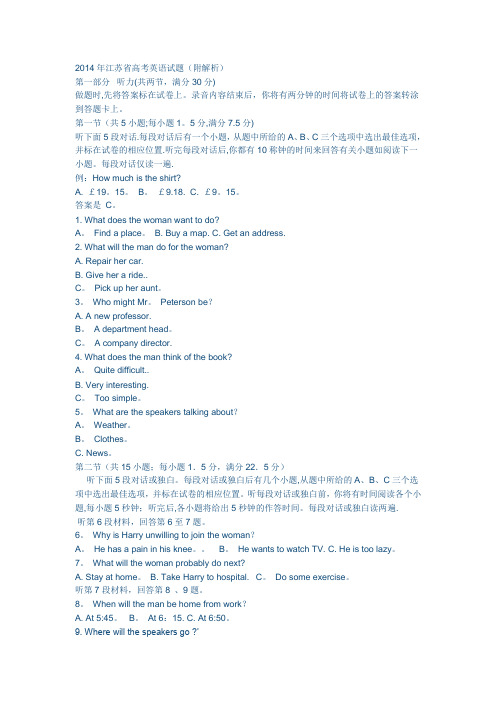
2014年江苏省高考英语试题(附解析)第一部分听力(共两节,满分30分)做题时,先将答案标在试卷上。
录音内容结束后,你将有两分钟的时间将试卷上的答案转涂到答题卡上。
第一节(共5小题;每小题1。
5分,满分7.5分)听下面5段对话.每段对话后有一个小题,从题中所给的A、B、C三个选项中选出最佳选项,并标在试卷的相应位置.听完每段对话后,你都有10称钟的时间来回答有关小题如阅读下一小题。
每段对话仅读一遍.例:How much is the shirt?A. £19。
15。
B。
£9.18. C. £9。
15。
答案是C。
1. What does the woman want to do?A。
Find a place。
B. Buy a map. C. Get an address.2. What will the man do for the woman?A. Repair her car.B. Give her a ride..C。
Pick up her aunt。
3。
Who might Mr。
Peterson be?A. A new professor.B。
A department head。
C。
A company director.4. What does the man think of the book?A。
Quite difficult..B. Very interesting.C。
Too simple。
5。
What are the speakers talking about?A。
Weather。
B。
Clothes。
C. News。
第二节(共15小题;每小题1.5分,满分22.5分)听下面5段对话或独白。
每段对话或独白后有几个小题,从题中所给的A、B、C三个选项中选出最佳选项,并标在试卷的相应位置。
听每段对话或独白前,你将有时间阅读各个小题,每小题5秒钟;听完后,各小题将给出5秒钟的作答时间。
2014年江苏高考英语试卷(含答案)

2014年江苏高考英语试卷(含答2014 年江苏高考英语试题第一部分听力(共两节,满分20 分)做题时,先将答案标在试卷上。
录音内容结束后,你将有两分钟的时间将试卷上的答案转涂到答题卡上。
第一节(共 5 小题;每小题 1 分,满分 5 分)听下面 5 段对话。
每段对话后有一个小题,从题中所给的 A 、B、C 三个选项中选出最佳选项,并标在试卷的相应位置。
听完每段对话后,你都有10 秒钟的时间来回答有关小题和阅读下一小题。
每段对话仅读一遍。
例: How much is the shirt?A. £9. 15.B. 2 18.C.妇.15.答案是C。
1. What does the woman want to do?A. Find a place.B. Buy a map.C. Get an address.2. What will the man do for the woman?A. Repair her car.B. Give her a ride.C. Pick up her aunt.3. Who might Mr. Peterson be?A. A new professor.B. A department head.C. A company director.4. What does the man think of the book?A. Quite difficult.B. Very interesting.C. Too simple.5. What are the speakers talking about?A. Weather.B. Clothes.C. News. 第二节(共15 小题;每小题1 分,满分15 分)听下面 5 段对话或独白。
每段对话或独白后有几个小题,从题中所给的A、B、C 三个选项中选出最佳选项,并标在试卷的相应位置。
听每段对话或独白前,你将有时间阅读各个小题,每小题 5 秒钟; 听完后,各小题给出5 秒钟的作答时间。
(完整word版)江苏2014年高考英语试题及答案
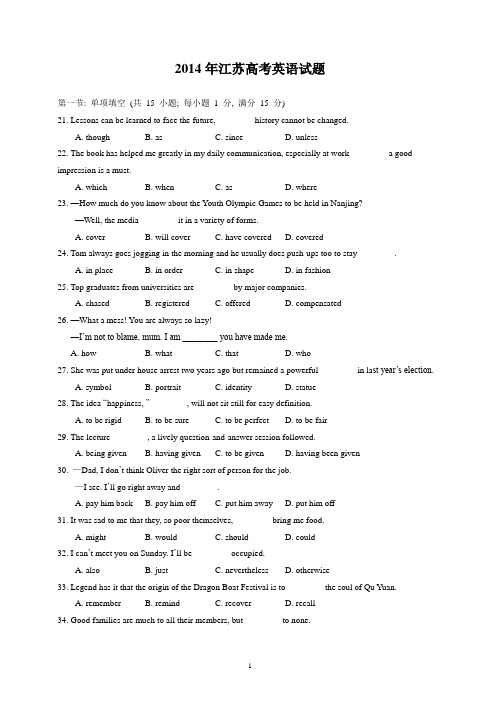
2014年江苏高考英语试题第一节: 单项填空(共15 小题; 每小题1 分, 满分15 分)21. Lessons can be learned to face the future, ________ history cannot be changed.A. thoughB. asC. sinceD. unless22. The book has helped me greatly in my daily communication, especially at work ________ a good impression is a must.A. whichB. whenC. asD. where23. —How much do you know about the Youth Olympic Games to be held in Nanjing?—Well, the media ________ it in a variety of forms.A. coverB. will coverC. have coveredD. covered24. Tom always goes jogging in the morning and he usually does push-ups too to stay ________.A. in placeB. in orderC. in shapeD. in fashion25. Top graduates from universities are ________ by major companies.A. chasedB. registeredC. offeredD. compensated26. —What a mess! You are always so lazy!—I’m not to blame, mum. I am ________ you have made me.A. howB. whatC. thatD. who27. She was put under house arrest two years ago but remained a powerful ________ in la st year’s election.A. symbolB. portraitC. identityD. statue28. The idea “happiness, ” ________, will not sit still for easy definition.A. to be rigidB. to be sureC. to be perfectD. to be fair29. The lecture ________, a lively question-and-answer session followed.A. being givenB. having givenC. to be givenD. having been given30. —Dad, I don’t think Oliver the right sort of person for the job.—I see. I’ll go right away and ________.A. pay him backB. pay him offC. put him awayD. put him off31. It was sad to me that they, so poor themselves, ________ bring me food.A. mightB. wouldC. shouldD. could32. I can’t meet you on Sunday. I’ll be ________ occupied.A. alsoB. justC. neverthelessD. otherwise33. Legend has it that the origin of the Dragon Boat Festival is to ________ the soul of Qu Yuan.A. rememberB. remindC. recoverD. recall34. Good families are much to all their members, but ________ to none.A. somethingB. anythingC. everythingD. nothing35. —________ ! Somebody has left the lab door open.—Don’t look at me.A. Dear meB. Hi, thereC. Thank goodnessD. Come on第二节: 完形填空(共20 小题; 每小题1 分, 满分20 分)Dale Carnegie rose from the unknown of a Missouri farm to international fame because he found a way to fill a universal human need.It was a need that he first 36 back in 1906 when young Dale was a junior at State Teachers College in Warrensburg. To get an 37 , he was struggling against many difficulties. His family was poor. His Dad couldn’t afford the 38 at college, so Dale had to ride horseback 12 miles to attend classes. Study had to be done 39 his farm-work routines. He withdrew from many school activities 40 he didn’t have the time or the 41 . He had only one good suit. He tried 42 the football team, but the coach turned him down for being too 43 . During this period Dale was slowly 44 an inferiority complex (自卑感), which his mother knew could 45 him from achieving his real potential. She 46 that Dale join the debating team, believing that 47 in speaking could give him the confidence and recognition that he needed.Dale took his mother’s advice, tried desperately and after several attempts 48 made it. This proved to be a 49 point in his life. Speaking before groups did help him gain the 50 he needed. By the time Dale was a senior, he had won every top honor in 51 . Now other students were coming to him for coaching and they, 52 , were winning contests.Out of this early struggle to 53 his feelings of inferiority, Dale came to understand that the ability to 54 an idea to an audience builds a person’s confidence. And, 55 it, Dale knew he could do anything he wanted to do—and so could others.36. A. admitted B. filled C. supplied D. recognized37. A. assignment B. education C. advantage D. instruction38. A. training B. board C. teaching D. equipment39. A. between B. during C. over D. through40. A. while B. when C. because D. though41. A. permits B. interest C. talent D. clothes42. A. on B. for C. in D. with43. A. light B. flexible C. optimistic D. outgoing44. A. gaining B. achieving C. developing D. obtaining45. A. prevent B. protect C. save D. free46. A. suggested B. demanded C. required D. insisted47. A. presence B. practice C. patience D. potential48. A. hopefully B. certainly C. finally D. naturally49. A. key B. breaking C. basic D. turning50. A. progress B. experience C. competence D. confidence51. A. horse-riding B. football C. speech D. farming52. A. in return B. in brief C. in turn D. in fact53. A. convey B. overcome C. understand D. build54. A. express B. stress C. contribute D. repeat55. A. besides B. beyond C. like D. with第三部分: 阅读理解(共15 小题; 每小题2 分, 满分30 分)请阅读下列短文, 从短文后各题所给的A、B、C、D 四个选项中, 选出最佳选项, 并在答题卡上将该项涂黑。
2014年江苏高考英语试卷(含答案)

2014年江苏高考英语试卷(含答案)2014年江苏高考英语试题第一部分听力(共两节,满分20 分)做题时,先将答案标在试卷上。
录音内容结束后,你将有两分钟的时间将试卷上的答案转涂到答题卡上。
第一节(共 5 小题;每小题 1 分,满分 5 分)听下面 5 段对话。
每段对话后有一个小题,从题中所给的A、B、C 三个选项中选出最佳选项,并标在试卷的相应位置。
听完每段对话后,你都有10 秒钟的时间来回答有关小题和阅读下一小题。
每段对话仅读一遍。
例: How much is the shirt?A. £ 19. 15.B. £ 9. 18.C. £ 9. 15.答案是C。
1. What does the woman want to do?A. Find a place.B. Buy a map.C. Get an address.2. What will the man do for the woman?A. Repair her car.B. Give her a ride.C. Pick up her aunt.3. Who might Mr. Peterson be?A. A new professor.B. A department head.C.A company director.4. What does the man think of the book?A. Quite difficult.B. Very interesting.C. Too simple.5. What are the speakers talking about?A. Weather.B. Clothes.C. News.第二节(共15 小题;每小题 1 分,满分15 分)听下面 5 段对话或独白。
每段对话或独白后有几个小题,从题中所给的A、B、C 三个选项中选出最佳选项,并标在试卷的相应位置。
2014年江苏英语高考试题(卷)含答案解析和解析
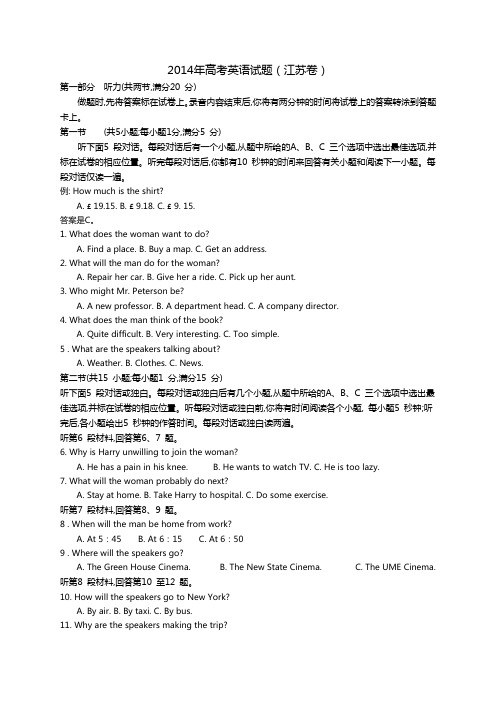
2014年高考英语试题(江苏卷)第一部分听力(共两节,满分20 分)做题时,先将答案标在试卷上。
录音内容结束后,你将有两分钟的时间将试卷上的答案转涂到答题卡上。
第一节(共5小题;每小题1分,满分5 分)听下面5 段对话。
每段对话后有一个小题,从题中所给的A、B、C 三个选项中选出最佳选项,并标在试卷的相应位置。
听完每段对话后,你都有10 秒钟的时间来回答有关小题和阅读下一小题。
每段对话仅读一遍。
例: How much is the shirt?A. £ 19.15.B. £ 9.18.C. £ 9. 15.答案是C。
1. What does the woman want to do?A. Find a place.B. Buy a map.C. Get an address.2. What will the man do for the woman?A. Repair her car.B. Give her a ride.C. Pick up her aunt.3. Who might Mr. Peterson be?A. A new professor.B. A department head.C. A company director.4. What does the man think of the book?A. Quite difficult.B. Very interesting.C. Too simple.5 . What are the speakers talking about?A. Weather.B. Clothes.C. News.第二节(共15 小题;每小题1 分,满分15 分)听下面5 段对话或独白。
每段对话或独白后有几个小题,从题中所给的A、B、C 三个选项中选出最佳选项,并标在试卷的相应位置。
听每段对话或独白前,你将有时间阅读各个小题, 每小题5 秒钟;听完后,各小题给出5 秒钟的作答时间。
2014_年江苏高考英语真题及解析
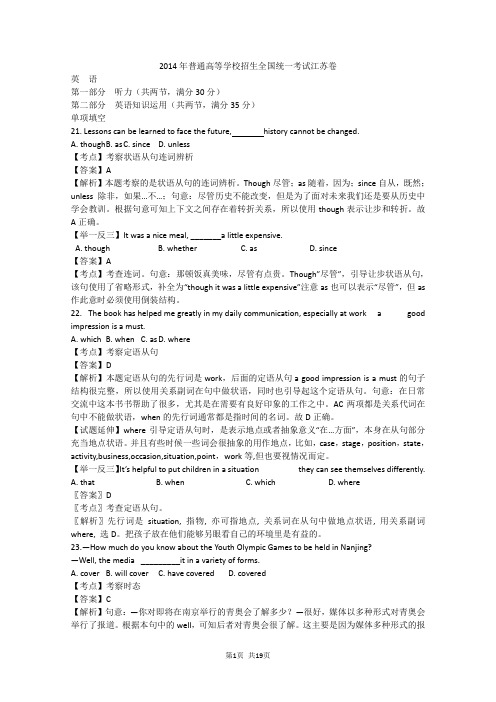
2014年普通高等学校招生全国统一考试江苏卷英语第一部分听力(共两节,满分30分)第二部分英语知识运用(共两节,满分35分)单项填空21. Lessons can be learned to face the future, history cannot be changed.A. thoughB. asC. sinceD. unless【考点】考察状语从句连词辨析【答案】A【解析】本题考察的是状语从句的连词辨析。
Though尽管;as随着,因为;since自从,既然;unless除非,如果…不…;句意:尽管历史不能改变,但是为了面对未来我们还是要从历史中学会教训。
根据句意可知上下文之间存在着转折关系,所以使用though表示让步和转折。
故A正确。
【举一反三】It was a nice meal, _______a little expensive.A. thoughB. whetherC. asD. since【答案】A【考点】考查连词。
句意:那顿饭真美味,尽管有点贵。
Though”尽管”,引导让步状语从句,该句使用了省略形式,补全为“though it was a little expensive”注意as也可以表示“尽管”,但as 作此意时必须使用倒装结构。
22. The book has helped me greatly in my daily communication, especially at work a good impression is a must.A. whichB. whenC. asD. where【考点】考察定语从句【答案】D【解析】本题定语从句的先行词是work,后面的定语从句a good impression is a must的句子结构很完整,所以使用关系副词在句中做状语,同时也引导起这个定语从句。
句意:在日常交流中这本书书帮助了很多,尤其是在需要有良好印象的工作之中。
2014年江苏省高考英语试题解析版

2014年江苏省高考英语试题(附解析)第一部分听力(共两节,满分30分)做题时,先将答案标在试卷上。
录音内容结束后,你将有两分钟的时间将试卷上的答案转涂到答题卡上。
第一节(共5小题;每小题1.5分,满分7.5分)听下面5段对话。
每段对话后有一个小题,从题中所给的A、B、C三个选项中选出最佳选项,并标在试卷的相应位置。
听完每段对话后,你都有10称钟的时间来回答有关小题如阅读下一小题。
每段对话仅读一遍.例:How much is the shirt?A. £19。
15. B。
£9.18。
C。
£9.15.答案是C。
1。
What does the woman want to do?A。
Find a place。
B. Buy a map。
C. Get an address.2. What will the man do for the woman?A。
Repair her car.B。
Give her a ride.。
C. Pick up her aunt。
3. Who might Mr. Peterson be?A。
A new professor.B. A department head.C. A company director.4。
What does the man think of the book?A. Quite difficult.。
B。
Very interesting。
C。
Too simple。
5. What are the speakers talking about?A。
Weather。
B. Clothes.C。
News。
第二节(共15小题;每小题1.5分,满分22.5分)听下面5段对话或独白。
每段对话或独白后有几个小题,从题中所给的A、B、C三个选项中选出最佳选项,并标在试卷的相应位置。
听每段对话或独白前,你将有时间阅读各个小题,每小题5秒钟;听完后,各小题将给出5秒钟的作答时间。
2014年江苏英语高考真题(含答案)
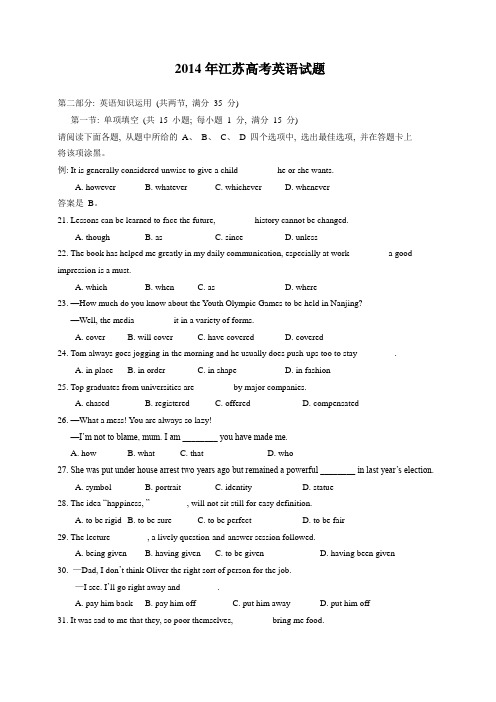
2014年江苏高考英语试题第二部分: 英语知识运用(共两节, 满分35 分)第一节: 单项填空(共15 小题; 每小题1 分, 满分15 分)请阅读下面各题, 从题中所给的A、B、C、D 四个选项中, 选出最佳选项, 并在答题卡上将该项涂黑。
例: It is generally considered unwise to give a child ________ he or she wants.A. howeverB. whateverC. whicheverD. whenever答案是B。
21. Lessons can be learned to face the future, ________ history cannot be changed.A. thoughB. asC. sinceD. unless22. The book has helped me greatly in my daily communication, especially at work ________ a good impression is a must.A. whichB. whenC. asD. where23. —How much do you know about the Youth Olympic Games to be held in Nanjing?—Well, the media ________ it in a variety of forms.A. coverB. will coverC. have coveredD. covered24. Tom always goes jogging in the morning and he usually does push-ups too to stay ________.A. in placeB. in orderC. in shapeD. in fashion25. Top graduates from universities are ________ by major companies.A. chasedB. registeredC. offeredD. compensated26. —What a mess! You are always so lazy!—I’m not to blame, mum. I am ________ you have made me.A. howB. whatC. thatD. who27. She was put under house arrest two years ago but remained a powerful ________ in last year’s election.A. symbolB. portraitC. identityD. statue28. The idea “happiness, ” ________, will not sit still for easy definition.A. to be rigidB. to be sureC. to be perfectD. to be fair29. The lecture ________, a lively question-and-answer session followed.A. being givenB. having givenC. to be givenD. having been given30. —Dad, I don’t think Oliver the right sort of person for the job.—I see. I’ll go right away and ________.A. pay him backB. pay him offC. put him awayD. put him off31. It was sad to me that they, so poor themselves, ________ bring me food.A. mightB. wouldC. shouldD. could32. I can’t meet you on Sunday. I’ll be ________ occupied.A. alsoB. justC. neverthelessD. otherwise33. Legend has it that the origin of the Dragon Boat Festival is to ________ the soul of Qu Yuan.A. rememberB. remindC. recoverD. recall34. Good families are much to all their members, but ________ to none.A. somethingB. anythingC. everythingD. nothing35. —________ ! Somebody has left the lab door open.—Don’t look at me.A. Dear meB. Hi, thereC. Thank goodnessD. Come on第二节: 完形填空(共20 小题; 每小题1 分, 满分20 分)请阅读下面短文, 从短文后各题所给的A、B、C、D 四个选项中, 选出最佳选项, 并在答题卡上将该项涂黑。
- 1、下载文档前请自行甄别文档内容的完整性,平台不提供额外的编辑、内容补充、找答案等附加服务。
- 2、"仅部分预览"的文档,不可在线预览部分如存在完整性等问题,可反馈申请退款(可完整预览的文档不适用该条件!)。
- 3、如文档侵犯您的权益,请联系客服反馈,我们会尽快为您处理(人工客服工作时间:9:00-18:30)。
二、完形填空Dale Carnegie rose from the unknown of a Missouri farm to international fame because he found a way to fill a universal human need.It was a need that he first back in 1906 when young Dale was a junior at State Teachers College in Warrensburg. To get an , he was struggling against many difficulties. His family was poor. His Dad couldn’t afford the at college, so Dale had to ride horseback 12 miles to attend classes. Study had to be done his farm-work routines. He withdrew from many school activities he didn’t have the time or the . He had only one good suit. He tried the football team, but the coach turned him down for being too . During this period Dale was slowly an inferiority complex (自卑感), which his mother knew could him from achieving his real potential. She that Dale join the debating team, believing that in speaking could give him the confidence and recognition that he needed.Dale took his mother’s advice, tried desperately and after several attempts made it. This proved to be a point in his life. Speaking before groups did help him gain the he needed. By the time Dale was a senior, he had won every top honor in . Now other students were coming to him for coaching and they, , were winning contests.Out of this early struggle to his feelings of inferiority, Dale came to understand that the ability to an idea to an audience builds a person’s confidence. And, it, Dale knew he could do anything he wanted to do—and so could others.16.A. admitted B. filled C. supplied D. recognized17.A. assignment B. education C. advantage D. instruction18.A. training B. board C. teaching D. equipment19.A. between B. during C. over D. through20.A. while B. when C. because D. though21.A. permits B. interest C. talent D. clothes22.A. on B. for C. in D. with23.A. light B. flexible C. optimistic D. outgoing24.A. gaining B. achieving C. developing D. obtaining25.A. prevent B. protect C. save D. free26.A. suggested B. demanded C. required D. insisted27.A. presence B. practice C. patience D. potential28.A. hopefully B. certainly C. finally D. naturally29.A. key B. breaking C. basic D. turning30.A. progress B. experience C. competence D. confidence31.A. horse-riding B. football C. speech D. farming32.A. in return B. in brief C. in turn D. in fact33.A. convey B. overcome C. understand D. build34.A. express B. stress C. contribute D. repeat35.A. besides B. beyond C. like D. with36.Why did the BeauxArts style attract American entrepreneurs?A. It helped display their money status.B. It was created by famous architects.C. It was named after a famous institute.D. It represented the 19th century urban culture.37.What is unique of SieMatic BeauxArts?A. Its designs are anti-conventional.B. Its designs come from famous structures.C. Its customers can enjoy their own composition.D. Its customers can choose from various new styles.BHowever wealthy we may be, we can never find enough hours in the day to do everything we want. Economics deals with this problem through the concept of opportunity cost, which simply refers to whether someone’s time or money could be better spent on something else.Every hour of our time has a value. For every hour we work at one job we could quite easily be doing another, or be sleeping or watching a film. Each of these options has a different opportunity cost—namely, what they cost us in missed opportunities.Say you intend to watch a football match but the tickets are expensive and it will take you a couple of hours to get to and from the stadium. Why not, you might reason, watch the game from home and use the leftover money and time to have dinner with friends? This—the alternative use of your cash and time—is the opportunity cost.For economists, every decision is made by knowledge of what one must forgo—in terms of money and enjoyment—in order to take it up. By knowing precisely what you are receiving and what you are missing out on, you ought to be able to make better-informed, more reasonable decisions. Consider that most famous economic rule of all: there’s no such thing as a free lunch. Even if someone offers to take you out to lunch for free, the time you will spend in the restaurant still costs you something in terms of forgone opportunities.Some people find the idea of opportunity cost extremely discouraging: imagine spending your entire life calculating whether your time would be better spent elsewhere doing something more profitable or enjoyable. Yet, in a sense it’s human nature to do precisely that—we assess the advantages and disadvantages of decisions all the time.In the business world, a popular phrase is “value for money.” People want their cash to go as far as possible. However, another is fast obtaining an advantage: “value for time.” The biggest restriction on our resources is the number of hours we can devote to something, so we look to maximize the return we get on our investment of time. By reading this passage you are giving over a bit of your time which could be spent doing other activities, such as sleeping and eating. In return, however, this passage will help you to think like an economist, closely considering the opportunity cost of each of your decisions.38.According to the passage, the concept of “opportunity cost” is applied to ________.A. making more moneyB. taking more opportunitiesC. reducing missed opportunitiesD. weighing the choice of opportunities39.The “leftover ... time” in Paragraph 3 probably refers to the time ________.A. spared for watching the match at homeB. taken to have dinner with friendsC. spent on the way to and from the matchD. saved from not going to watch the match40.What are forgone opportunities?A. Opportunities you forget in decision-making.B. Opportunities you give up for better ones.C. Opportunities you miss accidentally.D. Opportunities you make up for.CMost damagingly, anger weakens a person’s ability to think clearly and keep control over his behaviour. The angry person loses objectivity in evaluating the emotional significance of the person or situation that arouses his anger.Not everyone experiences anger in the same way; what angers one person may amuse another. The specific expression of anger also differs from person to person based on biological and cultural forces. In contemporary culture, physical expressions of anger are generally considered too socially harmful to be tolerated. We no longer regard duels (决斗)as an appropriate expression of anger resulting from one person’s awareness of insulting behaviour on the part of another.Anger can be identified in the brain, where the electrical activity changes. Under most conditions EEG (脑电图)measures of electrical activity show balanced activity between the right and left prefrontal (额叶前部)areas. Behaviourally this corresponds to the general even-handed disposition (意向)that most of us possess most of the time. But when we are angry the EEG of the right and left prefrontal areas aren’t balanced and, as a result of this, we’re likely to react. And our behavioural response to anger is different from our response to other emotions, whether positive or negative.Most positive emotions are associated with approach behaviour: we move closer to people we like. Most negative emotions, in contrast, are associated with avoidance behaviour: we move away from people and things that we dislike or that make us anxious. But anger is an exception to this pattern. The angrier we are, the more likely we are to move towards the object of our anger. This corresponds to what psychologists refer to as of ensive anger: the angry person moves closer in order to influence and control the person or situation causing his anger. This approach-and-confront behaviour is accompanied by a leftward prefrontal asymmetry (不对称)of EEG activity. Interestingly, this asymmetry lessens if the angry person can experience empathy (同感)towards the individual who is bringing forth the angry response. In defensive anger, in contrast, the EEG asymmetry is directed to the right and the angry person feels helpless in the face of the anger-inspiring situation. 41.The “duels” example in Paragraph 2 proves that the expression of anger ________.A. usually has a biological basisB. varies among peopleC. is socially and culturally shapedD. influences one’s thinking and evaluation 42.What changes can be found in an angry brain?A. Balanced electrical activity can be spotted.B. Unbalanced patterns are found in prefrontal areas.C. Electrical activity corresponds to one’s behaviour.D. Electrical activity agrees with one’s disposition.43.Which of the following is typical of offensive anger?A. Approaching the source of anger.B. Trying to control what is disliked.C. Moving away from what is disliked.D. Feeling helpless in the face of anger. 44.What is the key message of the last paragraph?A. How anger differs from other emotions.B. How anger relates to other emotions.C. Behavioural responses to anger.D. Behavioural patterns of anger.D45.Why is June 6, 1990 a special day for Mommy?A. Her dream of being a mother came true.B. She found her origin from her Chinese mother.C. She wrote the letter to her daughter.D. Her female line was well linked.46.How does Mommy feel about her being given away?A. It is bitter and disappointing.B. It is painful but understandable.C. She feels sorry but sympathetic.D. She feels hurt and angry.47.What does “I stood out like a sore thumb” in Paragraph 5 mean?A. I walked clumsily out of pains.B. I was not easy to love due to jealousy.C. I was impatient out of fear.D. I looked different from others.48.What can be inferred from Mommy’s Anglo family life?A. She used to experience an identity crisis.B. She fought against her American identity.C. She forgot the pains of her early years.D. She kept her love for Asia from childhood.49.Why did Mommy name her daughter “Shao-ming?”A. To match her own birth-name.B. To brighten the lives of the family.C. To identify her with Chinese origin.D. To justify her pride in Chinese culture.50.By “Your past is more complete than mine,” Mommy means ________.A. her past was completed earlier than Shao-ming’sB. Shao-ming has got motherly care and a sense of rootsC. her mother didn’t comfort her the way she did Shao-mingD. her past was spent brokenly, first in Asia, then in the US第二部分(共35 小题;每小题1 分,共35 分)21. A 22. D 23. C 24. C 25. A 26. B 27. A 28. B 29. D 30. B 31. C 32. D 33. D 34. C 35. A 36. D 37. B 38. B 39. A 40. C 41. D 42. B 43. A 44. C 45. A 46. A 47. B 48. C 49. D 50. D 51. C 52. C 53. B 54. A 55. D第三部分(共15 小题;每小题2 分,共30 分)56. A 57. C 58. D 59. C 60. B 61. C 62. B 63. A 64. D 65. D 66. B 67. D 68. A 69. C 70. B。
